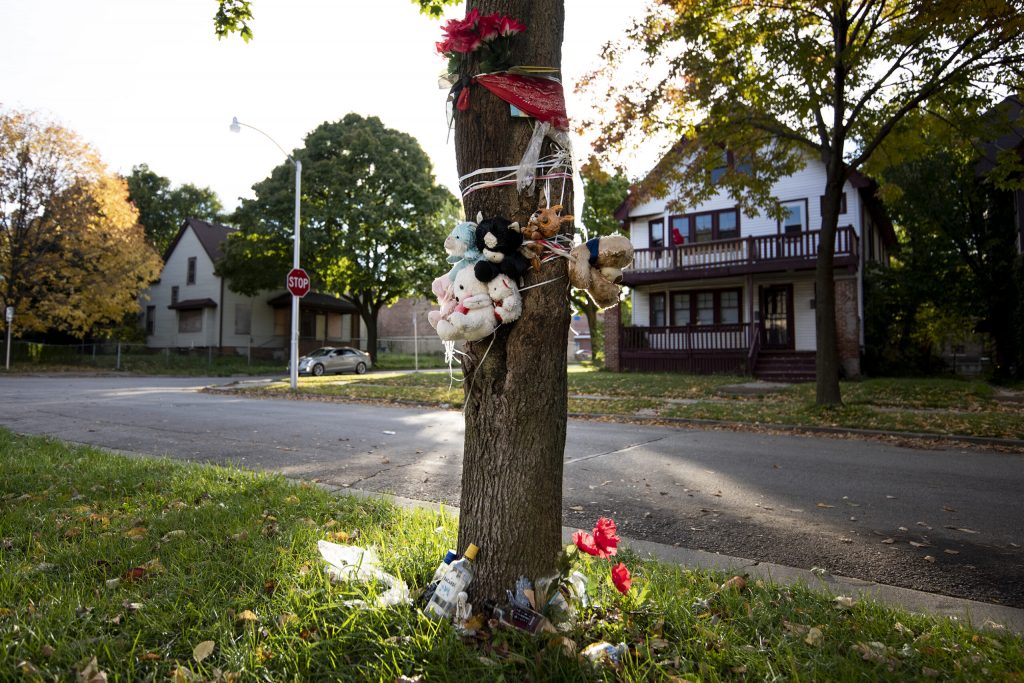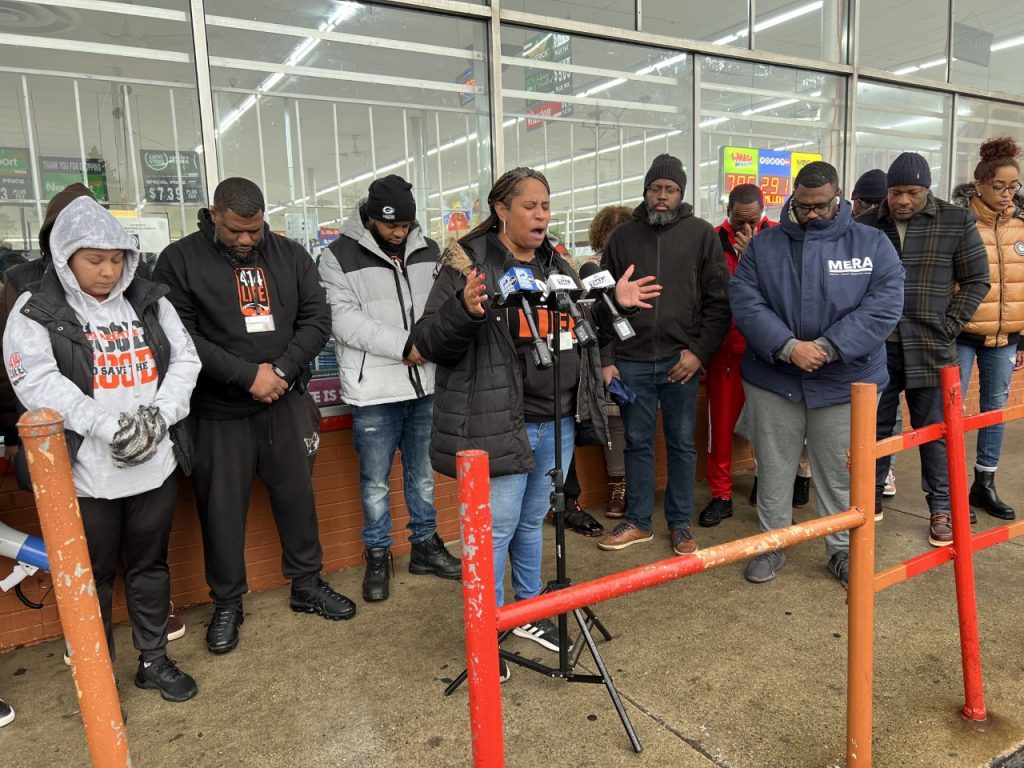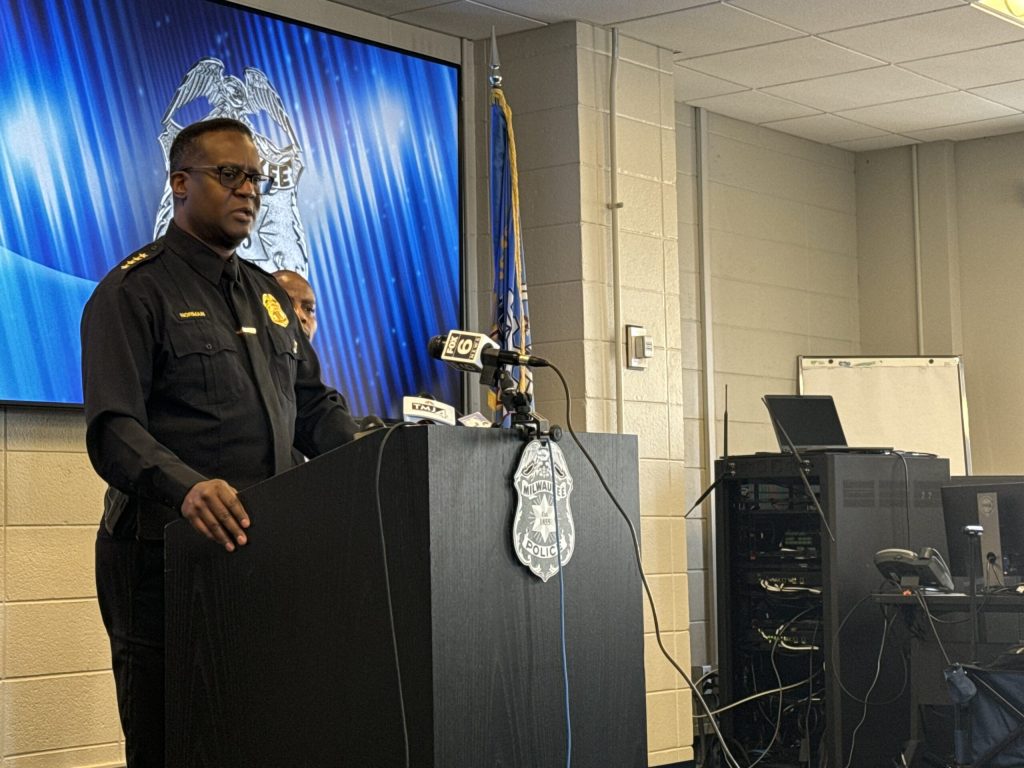Even With Murder Rate Decline, Domestic Violence Homicides Are Surging
Sojourner Family Peace Center says connecting victims of abuse to resources is vital.

Toys and flowers are tied to a tree in the Sherman Park neighborhood Tuesday, Oct. 26, 2021, in Milwaukee, Wis. Angela Major/WPR
Editor’s note: This story contains language surrounding domestic abuse.
Laurel Blackstone’s 15-year first marriage was marked by the agony of physical, sexual and emotional abuse.
After she escaped that relationship, Blackstone said, she was then abused by her second husband.
“My life was in shambles,” she added.
That’s when she found the Sojourner Family Peace Center, a Milwaukee-based organization focused on providing resources and help for people experiencing domestic abuse.
After the Milwaukee resident got help at the center, she started sharing her story with others. Now, she helps lead a group of domestic abuse survivors at the center, called the VOICES group. In recent years, she said she’s seen more and more people join the group.
Even as homicides in Milwaukee are trending down after the city broke its homicide record three years in a row, local leaders are still concerned about the number of domestic homicides and domestic violence-related deaths in Milwaukee County.
There were 16 domestic violence-related deaths in Milwaukee County in 2018. That number rose to 49 in 2022 and declined to 38 last year.

Community organizers in Milwaukee pray for peace following a violent 2022 on Jan. 3, 2023. Evan Casey/WPR
But advocates worry the numbers could be trending upward again — last month alone, seven people were killed in domestic violence-related homicides, according to data from the Sojourner Family Peace Center.
Carmen Pitre, president of the Sojourner Family Peace Center, said there were six domestic homicides, a murder-suicide attempt and two multiple stabbings all within around 14 days in Milwaukee County in April.
“I had never seen something so elevated within a two-week period,” Pitre said. “It’s very concerning.”
Pitre said more work needs to be done to help people leave dangerous relationships and get connected to resources before situations turn deadly.
“I think what the community is showing us is that we haven’t yet figured out how to solve this problem,” Pitre said. “…We know it starts with kids, and we know parents are wounded and have to help heal. And we have to provide resources for that to happen and we need to do it earlier in a person’s life.”
Police chief: ‘All-hands-on-deck issue’
Pitre said she first started to notice an uptick in domestic violence-related deaths in 2019. The COVID-19 pandemic didn’t help.
“COVID is not the cause, but it made everything that was hard, worse,” Pitre said.
She said that while other crimes, like nonfatal shootings and homicides, are on the decline in Milwaukee, “intimate partner violence is not.”
“At the core of it is a lack of connection between people and others and resources that would be helpful,” Pitre said.
Milwaukee Police Chief Jeffrey Norman said addressing domestic homicides is an “all-hands-on-deck issue.”
“As we know, the pandemic really had done a number on our community, and we’re still dealing with mental health and trauma that’s going on as a residual,” Norman said during a recent press briefing.
“We understand that we cannot have one particular solution to this. (It) is not something that’s going to be eradicated overnight,” he added.
Domestic violence has been on the rise in recent years across the state and nation. Wisconsin saw the largest increase in domestic violence-related deaths in the last two decades in 2022, setting a new record for the total number of homicides and suicides related to domestic violence incidents in the state, according a report from advocacy group End Domestic Abuse Wisconsin.
Pitre said there’s a “normalization of violence” in Milwaukee that should not be acceptable, and that often impacts children.
“We have people who were exposed as kids (to violence) who grew up believing that this is the way, this is what love is in a relationship. And we have a lot of work to do to untangle that and teach ourselves and heal ourselves and teach our young people that love and violence don’t go together,” Pitre said.
How does it get better?
Pitre said the organization is open to “deeper partnerships” with other community groups across the city. Ultimately, she said, domestic violence-related deaths are preventable.
“When you dive into the particulars, you see a lot of disconnection, which means we have to do work to get people better connected,” she said.
“We need to create meaningful doorways for them (victims) to walk through,” she added.
“The message for us is it’s vital that you reach out to someone,” she said. “Connect with someone — it could save your life.”
For Blackwell, she said it starts with education and awareness about the issue.
“Education as far as, there is help out there. They (victims) don’t realize that there’s help,” Blackwell said.
Blackstone, 55, said she’s worried she could’ve been a statistic if she didn’t seek help. She stayed at a women’s resource center in Racine after her first marriage.
“There’s so many out there that are going through this and we just need to let them know that they’re not alone, that there are people who have survived this and gone onto better lives,” she said.
Blackwell is now in a healthy relationship and says she’s happy.
“Life outside of abuse is possible,” she said.
Do you need help?
The Sojourner Family Peace Center has a 24-hour hotline and crisis shelter. You can call them at 414-933-2722 or text them at 414- 877-8100.
The National Domestic Violence Hotline number is 800-799-7233.
‘Very concerning’: Milwaukee leaders worried about recent domestic violence-related deaths was originally published by Wisconsin Public Radio.
If you think stories like this are important, become a member of Urban Milwaukee and help support real, independent journalism. Plus you get some cool added benefits.





















